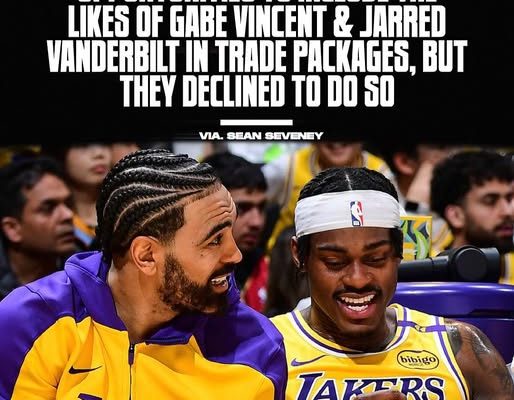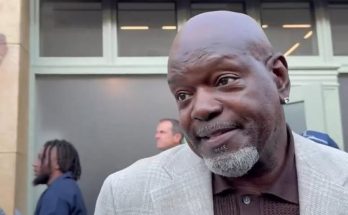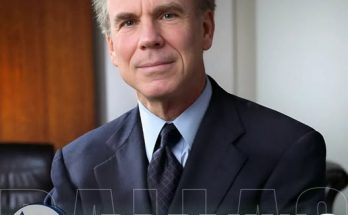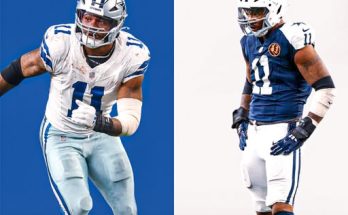The Los Angeles Lakers have long been known for their appetite for star power, blockbuster trades, and high-profile roster shakeups, but this offseason, the front office appears to be taking a more measured approach. According to multiple reports, the Lakers have had opportunities to include the likes of Gabe Vincent and Jarred Vanderbilt in trade packages, but have opted against it. The decision is not only a reflection of how the organization values those two players, but also an indication of their confidence in the roster as currently constructed. For a franchise that’s often been quick to make a splash, the quiet restraint is notable. Sources close to the situation suggest that the Lakers’ decision-making this summer has been grounded in the belief that the roster’s core already has the tools to contend, provided health and chemistry hold up.
Gabe Vincent, signed last summer to a three-year, $33 million deal after helping lead the Miami Heat to the NBA Finals, endured an injury-plagued debut season in Los Angeles. He appeared in just 11 regular season games due to knee issues, never quite finding his rhythm in purple and gold. Despite that, the Lakers still view him as a critical piece moving forward, particularly as a defensive-minded guard who can stretch the floor and provide playoff-caliber toughness. The coaching staff reportedly believes that with a full, healthy offseason and training camp, Vincent can return to the form he showed in Miami, where he thrived in big moments and proved capable of guarding elite perimeter players. His playoff experience and ability to fit alongside both LeBron James and Anthony Davis give the Lakers confidence that he can be an X-factor when games matter most.
Jarred Vanderbilt, acquired in the February 2023 trade that overhauled the Lakers’ roster midseason, has been another player the front office is reluctant to part with. Vanderbilt quickly established himself as one of the team’s most versatile defenders, capable of guarding positions one through five in spurts. His hustle, rebounding, and willingness to take on the toughest defensive assignments made him an instant favorite of both the coaching staff and the fanbase. While his offensive game remains limited, Vanderbilt’s energy and ability to disrupt opposing offenses have been invaluable. Like Vincent, Vanderbilt also battled injuries last season, appearing in only 29 games due to foot and heel issues, but the Lakers believe a healthy Vanderbilt can significantly bolster their defensive identity.
The Lakers’ choice to keep both players, despite having opportunities to package them in trades, suggests a shift in their approach. In previous years, especially during the LeBron era, the team has often leaned toward aggressive mid- and offseason moves to chase championships. This time, the front office is showing patience. The belief internally, according to those familiar with the organization’s thinking, is that the roster’s ceiling has yet to be fully reached because injuries prevented them from ever consistently deploying their best lineups. General manager Rob Pelinka and the basketball operations staff appear to be prioritizing stability and continuity over short-term roster shakeups, a decision that could either pay off in the form of improved chemistry or leave them wishing they had acted sooner if the season starts slowly.
From a broader perspective, this decision aligns with the Lakers’ desire to see how the team looks once the season gets underway before making any major changes. The NBA’s trade deadline is months away, and historically, many deals present themselves later in the season once teams reassess their trajectories. By holding onto Vincent and Vanderbilt now, the Lakers keep valuable mid-tier contracts and rotation pieces in hand, which could prove useful in larger trade frameworks down the line if the need arises. It’s a calculated decision — declining deals now doesn’t mean those players are untouchable forever, but it does signal that the Lakers aren’t eager to part with them for marginal upgrades.
There’s also the matter of locker room dynamics. The Lakers have emphasized building a culture of trust and buy-in over the past year, particularly after their 2023 post-trade deadline surge that carried them to the Western Conference Finals. Players like Vanderbilt embody the grit-and-grind mentality the team wants to foster, while Vincent’s playoff-tested demeanor fits the same mold. Trading them before they’ve had a chance to contribute fully could send the wrong message about the organization’s commitment to giving players a fair shot to prove themselves. In a league where relationships and morale can influence performance just as much as talent, the Lakers may be betting that a stable, united locker room will help them weather the inevitable ups and downs of the season.
That said, patience in the NBA always comes with risk. The Western Conference is as competitive as ever, with teams like the Denver Nuggets, Minnesota Timberwolves, Dallas Mavericks, and Oklahoma City Thunder all looking like legitimate threats. Standing pat while rivals continue to upgrade could leave the Lakers vulnerable if their internal improvements don’t materialize. However, it’s also true that making a trade just for the sake of change can be more damaging than doing nothing. For the Lakers, the calculus appears to be that the potential upside of a healthy Vincent and Vanderbilt outweighs the uncertain return of whatever trade packages have been offered thus far.
Another factor is financial flexibility. Vincent and Vanderbilt both have manageable contracts that are attractive in trade scenarios but also fit neatly into the Lakers’ current salary structure. Keeping them maintains the team’s ability to remain competitive without triggering unnecessary luxury tax penalties. It also preserves the option to use their contracts as part of a larger deal later, should a true difference-maker become available. Given the looming possibility of bigger names hitting the market as the season progresses — a common trend in recent NBA years — the Lakers may simply be keeping their powder dry.
From a basketball standpoint, Vincent offers floor spacing and defensive versatility in the backcourt, something the Lakers lacked at times last season when injuries hit. His ability to guard both point guards and shooting guards, combined with a reliable three-point shot when healthy, makes him an ideal fit next to ball-dominant stars. Vanderbilt, on the other hand, gives the Lakers the option to play a switch-heavy defense, something that could be critical in playoff matchups against teams like the Warriors, Clippers, or Mavericks. His length and quickness allow him to disrupt passing lanes, contest shots, and crash the boards, often changing the momentum of games through sheer effort plays.
The Lakers’ confidence in these players is also a testament to their scouting and development philosophy. Both Vincent and Vanderbilt are role players who have carved out value not through gaudy stats, but by excelling in specialized roles. In a league obsessed with stars, finding and keeping high-level role players can be the difference between winning and losing in the postseason. The front office’s decision to hold onto them reflects an understanding that championship teams are built not just on All-NBA talent, but also on the glue guys who make the system work.
Looking ahead, the real test of this decision will come in the first few months of the season. If Vincent and Vanderbilt stay healthy and make the impact the Lakers envision, this patience could be praised as foresight. If not, questions will inevitably arise about whether the team missed an opportunity to improve when they could. The early-season schedule will likely play a role in determining the urgency of any potential moves. A slow start could force the Lakers to revisit the trade market sooner than planned, while a strong start would only reinforce their decision to stay the course.
In the end, the Lakers’ decision to decline trade packages involving Vincent and Vanderbilt is as much about philosophy as it is about roster construction. It signals a willingness to bet on internal improvement, health, and chemistry — qualities that are often overlooked in a league dominated by headlines about blockbuster deals. For a franchise that has built its identity on big moves, the quiet confidence to say “no” might be the boldest decision of all. Whether it leads to a deep playoff run or a midseason scramble to make changes, the choice will be remembered as a defining moment of this offseason. The Lakers have drawn their line in the sand for now, and only time will tell if it’s the right one.



